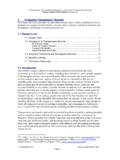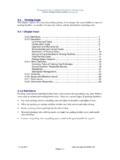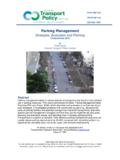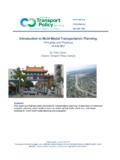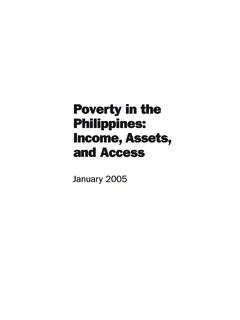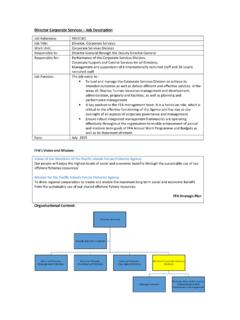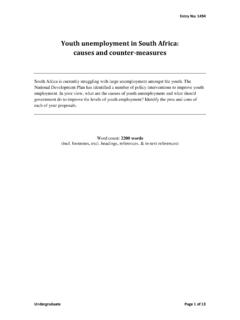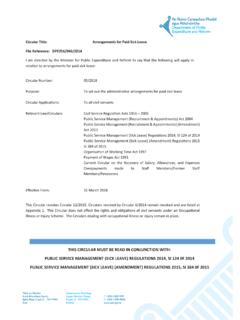Transcription of Issues in sustainable transportation
1 Int. J. Global Environmental Issues , Vol. 6, No. 4, 2006 331 Copyright 2006 Inderscience Enterprises Ltd. Issues in sustainable transportation Todd Litman* Victoria Transport Policy Institute, 1250 Rudlin Street, Victoria, BC, V8V 3R7, Canada Fax: 250-360-1560 E-mail: E-mail: *Corresponding author David Burwell Project for Public Spaces, New York City, USA E-mail: Abstract: There is growing interest in sustainability, sustainable development, and sustainable transportation . This paper identifies Issues related to the definition, evaluation and implementation of sustainable transportation . Significant Issues include the range of definitions of sustainability, the range of Issues considered under sustainability, the range of perspectives, criticism of sustainability analysis, evaluating sustainability, transportation impacts on sustainability, goals vs. objectives, sustainable transport decision making, approaches to sustainable transport, automobile dependency, equity, land use, community liveability, and sustainable transportation solutions.
2 sustainable development originally focused on a few resource consumption Issues , but it is increasingly defined more broadly to include economic and social welfare , equity, human health and ecological integrity. A narrow definition of sustainable transport tends to favour individual technological solutions, while a broader definition tends to favour more integrated solutions, including improved travel choices, economic incentives, institutional reforms, land use changes as well as technological innovation. Sustainability planning may require changing the way people think about and solve transportation problems. Keywords: sustainable transportation ; transport planning; transport economics; comprehensive planning; transport market reform; automobile dependency; equity; smart growth; paradigm shift. Reference to this paper should be made as follows: Litman, T. and Burwell, D. (2006) Issues in sustainable transportation , Int.
3 J. Global Environmental Issues , Vol. 6, No. 4, 347. Biographical notes: Todd Litman is Founder and Executive Director of the Victoria Transport Policy Institute, an independent research organisation dedicated to developing innovative solutions to transportation problems. His research is used worldwide in transportation planning and policy analysis. He is active in several professional organisations, including the Institute of transportation Engineers, the transportation Research Board, and the Canadian Centre for sustainable transportation . He chairs the transportation Research Board (a division of the US National Academy of Sciences) sustainable transportation indicators Subcommittee. David Burwell Chairs the transportation Research Board Task Force on transportation and Sustainability, and serves on a panel on Combating Global 332 T.
4 Litman and D. Burwell Warming Through sustainable Surface transportation Policy . He is Director of transportation Programs and Strategic Management for the Project for Public Spaces ( ), a nonprofit organisation dedicated to creating and sustaining public places that build communities. As a co-founder of the Rails-to-Trails Conservancy, and its President and CEO from 1986 2001, he created and managed a grassroots advocacy campaign to preserve America s system of abandoned rail corridors for conversion to trails and greenways. He was also a co-founder, fundraiser, President and CEO of the Surface transportation Policy Project, a national coalition to change transportation policy and to restore balance in transportation service delivery. 1 Introduction There is growing interest in sustainability, sustainable development, and sustainable transport.
5 Many papers, reports and books have been published dealing with sustainability Issues , and many communities are involved in sustainable planning projects. The nature and scope of these Issues , and their implications for transportation planning and policy are only beginning to be explored. Several factors contribute to interest in these Issues . Concern about sustainability is rooted in the growing awareness that human activities have significant environmental impacts that can impose economic, social and ecological costs. Global air pollution, the durable effects of manufactured toxins, degraded natural resources such as fresh water and fisheries, and the cross-border nature of many environmental problems all highlight the need to view human impacts from a broad perspective. Sustainability emphasises the integrated nature of human activities and therefore the need to coordinate planning among different sectors, jurisdictions and groups.
6 Sustainability planning is to development what preventive medicine is to health: it anticipates and manages problems rather than waiting for crises to develop. sustainable development strives for an optimal balance between economic, social and ecological objectives. Sceptics might conclude that sustainable planning is simply a new name for comprehensive planning. This may be true, but many jurisdictions have done a poor job of such planning. The concept of sustainability provides a framework and tools for long-term, comprehensive planning, which recognises the complex relationships that transcend conventional geographic and temporal borders. 2 Defining sustainability There is no universally accepted definition of sustainability, sustainable development or sustainable transport (Beatley, 1995). Definitions include: sustainable development meets the needs of the present without compromising the ability of future generations to meet their own needs.
7 Brundtland Commission, 1987) sustainable development is the achievement of continued economic development without detriment to the environmental and natural resources. (Themes sustainable Development, 2004) Issues in sustainable transportation 333 The goal of sustainable transportation is to ensure that environment, social and economic considerations are factored into decisions affecting transportation activity. (MOST, 1999) .. sustainability is not about threat analysis; sustainability is about systems analysis. Specifically, it is about how environmental, economic, and social systems interact to their mutual advantage or disadvantage at various space-based scales of operation. ( transportation Research Board, 1997) Sustainability is the capacity for continuance into the long term future . Anything that can go on being done on an indefinite basis is sustainable .
8 Anything that cannot go on being done indefinitely is unsustainable (Center for Sustainability, 2004) Concern about sustainability can be considered a reaction to the tendency in decision making to focus on easy-to-measure goals and impacts, while ignoring those that are more difficult to measure. sustainable decision making can therefore be described as planning that considers goals and impacts regardless of how difficult they are to measure. Interest in sustainability originally reflected concerns about long-term risks of current resource consumption, reflecting the goals of intergenerational equity ( , being fair to future generations) and ecological integrity. But if future equity and environmental quality are concerns, it makes little sense to ignore equity and environmental impacts that occur during this generation in distant places.
9 Thus, sustainability ultimately reflects the goals of equity, ecological integrity and human welfare , regardless of time or location. Ecological economics (a discipline concerned with valuing ecological resources) defines sustainability in terms of natural capital, the value of natural systems to provide goods and services, including clean air and water, and climatic stability (Jansson et al., 1994). Preserving these services is equivalent to a business maintaining the value of its productive assets. Ecological economists argue that consumption should not deplete natural capital at a faster rate than it can be replaced by viable and durable human capital. This suggests, for example, that non-renewable resources such as petroleum should not be depleted without sufficient development of substitutes, such as renewable energy sources. Ecological economics attempts to account for non-market costs of economic activities, which tend to be ignored in traditional economics or even considered positive economic events by indicators such as gross domestic product (Daly and Cobb, 1989).
10 This requires determining the economic value of non-market goods and services, such as the benefits that a wetland provides in terms of improving water quality and supporting fishing industries. sustainable economics maintains a distinction between growth (increased quantity) and development (increased quality) (Daly, 1996). It focuses on social welfare outcomes rather than simply measuring material wealth, and questions common economic indicators such as gross domestic product, which measure the quantity but not the quality of market activities. Unlike neoclassic economics, sustainable economics does not strive for ever-increasing consumption, but rather for sufficiency. Sustainability tends to reflect a conservation ethic, which means that production and consumption patterns are structured to minimise resource consumption and waste. This requires changing current economic policies that encourage inefficient production and consumption.
